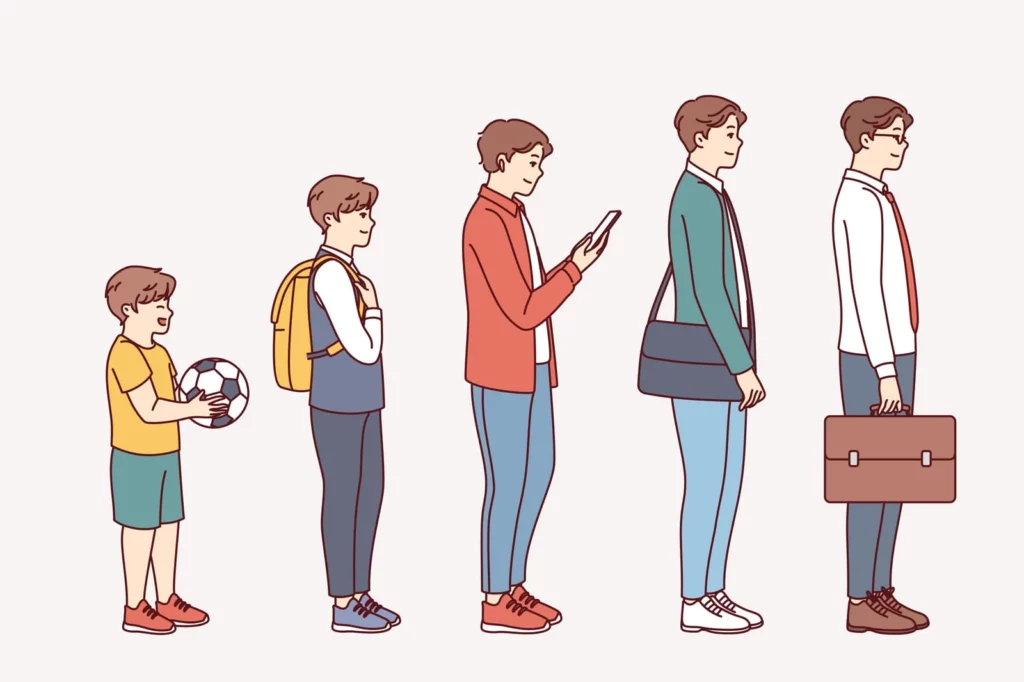
Life Transition Therapy in NYC
Sometimes you just need to talk it out.
Learn how our Psychiatrist can help you.
What are life transitions?
Life transitions are significant shifts in our lives that can profoundly impact our emotional and mental well-being. Whether planned or unexpected, these transitions often challenge our sense of stability, leading to a range of emotions from excitement to uncertainty or distress.
Navigating these changes requires adaptation and coping strategies. It involves redefining oneself in new circumstances, learning to let go of the old, and embracing the new. This experience, while potentially stressful, also offers opportunities for personal growth and development, encouraging individuals to explore new aspects of their identity and life paths.


Developmental Transitions
- Childhood to adolescence: This phase is marked by significant physical, emotional, and social changes. Puberty brings about physical transformations, while emotionally, there’s a growing need for independence and self-discovery. Socially, friendships and romantic interests start to play a more central role, often leading to conflicts with parents and shifts in family dynamics.
- Adolescence to adulthood: This transition involves making critical life decisions, such as pursuing higher education or starting a career. It’s a time for establishing financial independence and navigating adult relationships, including serious romantic commitments. Moving away from home introduces a new level of freedom and self-responsibility.
- Midlife transitions: Often seen as a period of self-reflection and re-evaluation, this stage involves reassessing career paths, personal relationships, and life goals. Physical signs of aging may affect self-esteem, and responsibilities may include caring for aging parents while supporting children.
- Retirement and later life: Retirement is a significant shift, marking the end of a career and the beginning of a new life chapter. It offers opportunities for new activities and hobbies, but also brings challenges like health issues and adjusting to a different daily routine. This period is also about enjoying time with family and coping with the loss of peers.
Situational Transitions
- Career changes: Whether it’s starting a new job, shifting careers, or facing unemployment, each scenario brings its unique challenges. Adapting to new work environments, building relationships with new colleagues, and mastering different skills can be stressful. Unemployment can lead to financial strain and a loss of identity, while career advancement might bring increased responsibilities and pressure.
- Relocation: Moving to a new location, especially to a different cultural setting, can be both exciting and disorienting. It involves leaving behind familiar surroundings and social networks and adapting to new communities. This transition can be particularly challenging for children and spouses who have to establish new connections and routines.
- Financial changes: Significant shifts in financial status, such as receiving an inheritance, facing a financial loss, or adjusting to a different income level after a career change, can significantly impact one’s lifestyle and self-perception. These changes often require reevaluation of priorities and adaptation to new financial realities.


Health-Related Transitions
- Chronic illness: Adapting to life with a chronic illness involves not just physical adjustments but also emotional and psychological coping. It can change one’s daily routine, impact work and social life, and require ongoing medical care and lifestyle changes.
- Recovery from injury or illness: This often involves a period of rehabilitation, where one might have to re-learn certain skills or adapt to new limitations. It can be a time of significant physical and emotional strain, requiring patience and resilience.
- Mental health challenges: Dealing with mental health issues like depression, anxiety, or PTSD is a profound life transition. It often involves navigating the healthcare system, finding effective treatments, and dealing with the stigma associated with mental illness.
Relational Transitions
- Entering or leaving a relationship: Starting a new relationship or marriage can bring joy and fulfillment but also requires adjustments in lifestyle and compromises. Conversely, breakups or divorces can be emotionally devastating and involve legal complexities, financial negotiations, and co-parenting challenges if children are involved.
- Parenthood: The transition to parenthood is one of life’s most significant changes. It involves a complete shift in priorities, lifestyle, and relationships. New parents often face sleep deprivation, changes in their relationship dynamics, and the pressure of making the right choices for their child’s well-being.
- Loss of a loved one: Grieving the death of a loved one is a deeply personal and often long-term process. It involves coming to terms with the loss, adjusting to life without the person, and finding ways to keep their memory alive. This transition can also bring about changes in family dynamics and responsibilities.

Challenges of life transitions
Challenges during life transitions often involve emotional and psychological adjustments. Individuals may face uncertainty and anxiety about the future, struggles with letting go of past roles or identities, and difficulties in adapting to new environments or expectations. These transitions can also strain personal relationships and lead to feelings of isolation or disconnection.
Additionally, practical challenges such as financial strain or logistical complexities can arise, requiring new problem-solving strategies and resilience. Navigating these challenges successfully often involves seeking support, developing coping skills, and embracing change as an opportunity for growth and self-discovery.
WHAT WE ACHIEVED
Why Us
- Our practice is patient-centered and individualized to meet the needs of each of our patients
- Our patients' health and well-being are always our number 1 priority
- Our providers have multi-layered experience with various mental health challenges
PATIENTS SERVICED
YEARS IN BUSINESS

How can therapy for life transitioning help?
Life transition therapy offers the opportunity to talk about big upheavals with a therapist. Any form of treatment is likely to be effective in assisting a person in adjusting to significant changes in their lives. When significant shifts occur, it can lead to stress, anxiety, or depression, and a qualified therapist can help treat associated symptoms while developing coping strategies.
When people know that they do not cope well with change, life transitioning therapy can be effective in dealing with changes before they even occur. This allows one to be better prepared for changes that arise whether planned or unplanned. Some people who have gone through a certain kind of change, such as a serious sickness or disability or a divorce, may also find benefit from support groups and group therapy sessions.
Testimonials
Choosing GoodHealth for life changes
Transitions in life can affect everyone, but major life changes can be more difficult to navigate than others. People can benefit from therapy for life changes with Good Health’s team of mental health professionals. The purpose of life transition therapy is to provide people with the tools they need to effectively cope with these emotionally difficult life changes. Our therapists employ a combination of strategies to assist clients in feeling ready for upcoming transitions.
Although it takes some time to get used to what life has in store, these techniques are helpful in reducing symptoms related to stress and anxiety and they minimize the shock associated with major change. The Good Health team helps clients to accept change, stay optimistic, reframe thinking patterns, manage stress, and have reasonable expectations.
Don't hesitate to contact us
Have any questions?
Please complete the form below and we will get right back to you.











